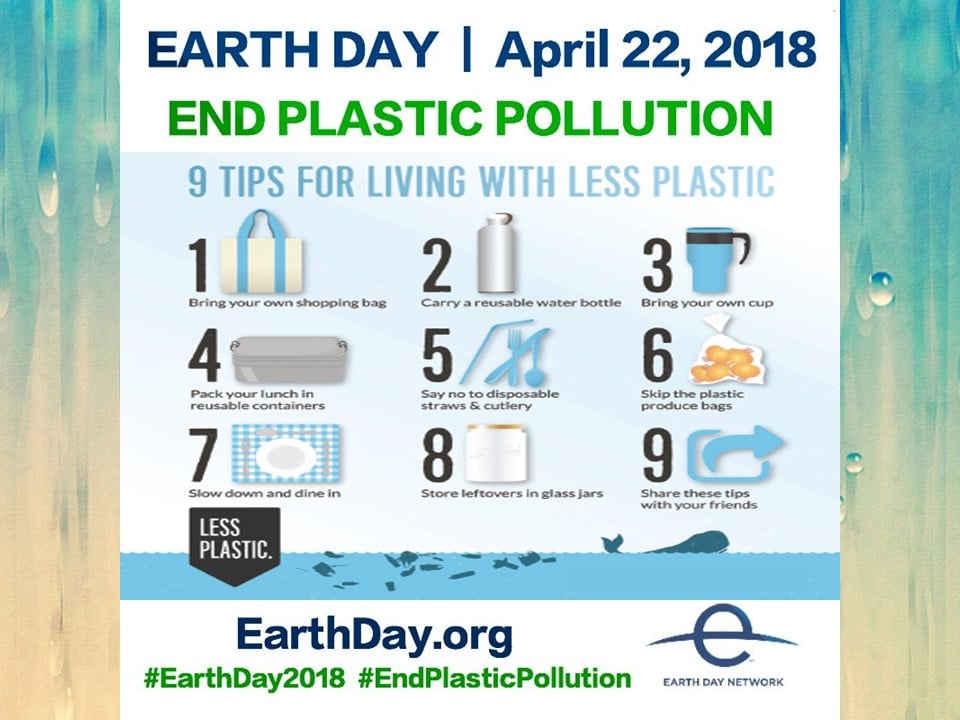
On Sunday, April 22, more than a billion people around the world will celebrate Earth Day by participating in neighborhood clean-up efforts. The grassroots movement began in 1970 when twenty million Americans took to the streets to voice their concern about the deteriorating environment and to urge lawmakers to take action before it was too late. Now boasting over 50,000 partners in 195 countries, the Earth Day Network (EDN) is credited with instigating many of our current environmental policies, including the Clean Air Act, Clean Water Act, and Endangered Species Act.
Earth Day 2018 is dedicated to the most significant environmental problem facing our planet today – plastic pollution. The non-profit hopes to reduce or hopefully eradicate the polymer altogether with numerous initiatives. These include garnering global support to eliminate single-use plastics, leading the charge to impose strict regulations for plastic disposal, and educating the general public about the health and other risks associated with the polymer. While bringing global change may take some time, these companies and individuals have already devised innovative ways to reduce plastic pollution.
Plastic Bank
According to David Katz, the founder of Vancouver, Canada-based nonprofit Plastic Bank, “The only way to stop ocean plastic is to reveal the value into the hands of collectors.” The philanthropic company does this by incentivizing people in developing countries like Haiti to collect ocean plastic in exchange for cash, goods, or services. The trash collected is recycled and sold as Social Plastic to corporations or local entrepreneurs who pay above-market prices to help the cause.
Liter of Light
Since 2011, the aptly named Liter of Light has been reducing pollution by transforming plastic bottles into light sources. According to Unesco, there are over 1.5 billion people in the world who have no access to electricity, many of whom resort to using dangerous paraffin lamps. For a safer and cheaper alternative, the grassroots movement fills used plastic bottles with water and bleach and attaches them to roofs to reflect sunlight during the day. The simple contraption illuminates the dark, windowless shanty homes with light equivalent to that provided by a 50-watt conventional bulb. When the sun sets, a micro solar panel with a battery helps power an LED bulb attached to the roof.
Over the years, Liter of Light has brought the green “power” to millions of people in rural villages worldwide and reused thousands of bottles. In 2018, the volunteer-run organization aspires to reach one million homes. Given that it has already lit up 850,000 homes in more than 15 countries, don’t be surprised if they surpass the lofty goal.
The Ocean Cleanup Foundation
Since age 16, Boyan Slat has had one dream – to clean up the trillions of pieces of plastic that are polluting our oceans and killing precious marine life. In 2013, the then 18-year-old dropped out of college to establish The Ocean Cleanup Foundation. The nonprofit’s mission was to build an environmentally-friendly, large-scale, and efficient method to extract ocean plastic litter and to raise global awareness.
The young innovator, who raised $22 million to help fund the project, recently announced that he expects to deploy the first operational cleanup system in the Great Pacific Garbage Patch, located between California and Hawaii, by mid-2018, almost two years ahead of his original target date of 2020. The small solar-powered arrays, kept in place by underwater “anchors,” are designed to collect the surface garbage as it floats past. The accumulated plastic will be brought to land for recycling. Slat believes his invention will allow us to clean 50 percent of the patch within five years.
You and Me

Luckily, we don’t have to be part of a major movement to help make a difference. Simply choosing to recycle, reuse, or avoiding plastic altogether can be a great start to reduce the polymer-based waste. In addition to cutting back plastic consumption there are many other ways to reduce our ecological footprint. Consider making small changes like walking instead of driving, taking shorter showers, ditching plastic straws, unplugging appliances when not in use, or even planting a tree!
Happy Earth Day!
Resources: literlight.com, oceancleanupfoundation.org, plasticbank.org
